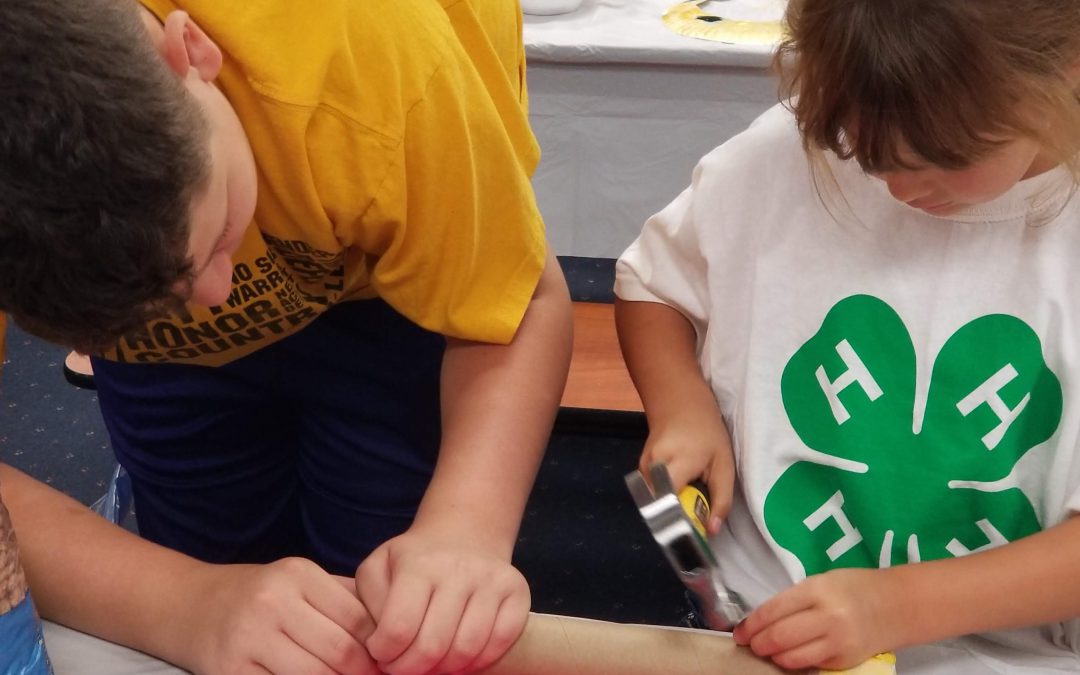
by Niki Crawson | May 19, 2023
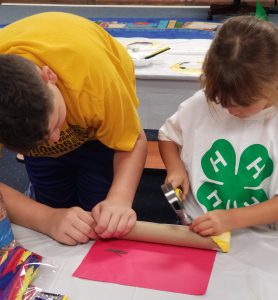
We know that younger youth look up to older youth and like to model their behaviors. We see it in siblings all the time, absorbing behaviors of their older brothers or sisters like sponges. Often times, younger youth find the attention and encouragement of older youth more relatable due to the closeness in age. Peer teaching fosters a more engaging and even symbiotic learning experience as this gives teens the opportunity to share and reinforce their own knowledge. In addition, by pairing the two age groups together in a learning environment, a sense of comradery can develop, creating a greater sense of belonging within the 4-H community. In this post, we will define peer teaching, share a few examples of how to utilize your teens as teachers and provide tips for getting peer teaching started in your clubs and other 4-H events and activities successfully.
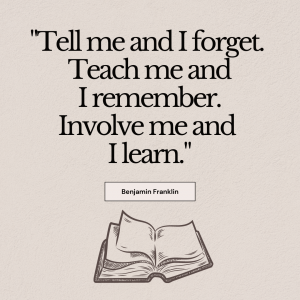
WHAT IS PEER TEACHING?
What do we mean by peer teaching exactly? It is the process of youth learning together and from each other through engaging, hands-on activities. In 4-H, we have the wonderful ability to utilize teens as volunteers and positive role models for our younger youth in our positive youth development programs. Empowering our teens as teachers for our younger members allows life skills to develop among our youth being instructed and also the instructors. The teen instructors are teaching specific topics to their peers at the same time they are strengthening their own leadership, communication, and social skills.
WHAT ARE THE BENEFITS OF PEER TEACHING?
As stated previously, one of the greatest outcomes is that the teacher and the student both gain knowledge and skills. It creates a mutually beneficial environment in which all youth can achieve personal growth and development if implemented and managed correctly. In addition, there are many other benefits of peer teaching such as:
- Peers being taught may form a quicker and better connection with teens due to communication, technology and other trends.
- An increase in peer confidence as they may feel more comfortable in asking questions, discussing topics with others closer to their age.
- Greater creativity as teens may have more innovative or modern ideas to bring to the activities.
- An increase in volunteers as teens have the ability to recruit more teens easier than typical adult volunteers.
- An increase in retention of youth as peers stay in the program and become the next generation of teen volunteers/teachers.
WHAT DOES PEER TEACHING LOOK LIKE IN 4-H?
Below are just a few programs for teens to practice the method of peer teaching in their 4-H county:
- New Members – When new youth join 4-H, it can be overwhelming at times to learn some of the 4-H activities, customs, and such. This would be a great opportunity for
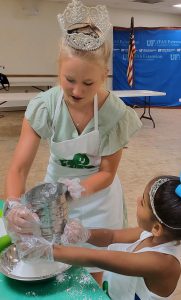 peer teaching. Have teens assigned to new members that join in order to teach them the 4-H pledge, motto, club expectations, member names, etc. This creates a greater sense of belonging and fosters a supportive environment within the club for new members to engage more quickly and successfully.
peer teaching. Have teens assigned to new members that join in order to teach them the 4-H pledge, motto, club expectations, member names, etc. This creates a greater sense of belonging and fosters a supportive environment within the club for new members to engage more quickly and successfully.
- Cloverbud Club Meetings – Utilizing your teen members in club meetings involving Cloverbuds (members ages 5-7) is a great way to incorporate peer teaching in your 4-H program. Younger members thrive off of creativity and enthusiasm which teens often portray easily. Teens can funnel this energy into teaching lessons to Cloverbuds that are engaging and interactive in a simplistic way.
- Summer Day Camps – 4-H programs often times need additional volunteers during the summer to assist with the volume of programming and youth participants. Therefore, summer is a great time to recruit teens to become peer teachers. Having teens as peer teachers helps with supervision and instruction while at the same time, allows them to stay involved in 4-H, continue to apply their life skills learned, and help the program teach life skills to other youth in the community.
TIPS TO GET PEER TEACHING STARTED IN YOUR 4-H COUNTY
What does it take to get peer teaching started in your 4-H county? Time and patience to start with. Teaching with teens is an ongoing task and will take a little effort on your part. Below are a few tips to get you started on having teens peer teach in your county:
- Identify programming that would benefit by peer teaching.
- Recruit quality teen teachers.
- Train and support teens as peer teachers.
- Assign teens appropriate roles in the peer teacher process.
- Model appropriate teaching methods in 4-H programs.
- Shadow teens in the role as peer teachers to provide support and guidance.
- Evaluate, provide feedback, and continue professional development for continued success.
Remember, peer teaching is a great way to utilize teen members in your 4-H programs. Younger youth need as many positive role models as possible in their lives. By having teen teachers take the lead in instruction in your 4-H programs, you are fostering an environment of learning, inclusivity, empowerment, and leadership.
To learn more about 4-H opportunities where teens can take the lead as teachers for their peers, please contact your local UF IFAS County Extension Office, or visit http://florida4h.org.
ADDITIONAL SOURCES:
Burse, G., Crocker, E. T., Jordan, J., McKinney, M., & Murphy, L. (2021). Teens as Teachers 4-H Project: Curriculum and Resources. UF/IFAS Extension, University of Florida. Retrieved May 1, 2023, from https://edis.ifas.ufl.edu/publication/4H432
Eckhoff, A., & Swistock, B. (2011). Staffing with Teenagers and Teens as Cross-Age Teachers. Rutgers Cooperative Extension.
by Marcus Boston Jr. | Apr 13, 2023
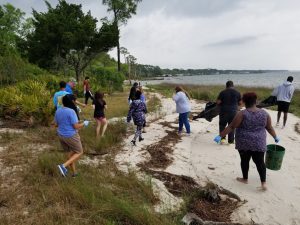 Life skills for youth are defined as a set of abilities and competencies that enable young people to successfully navigate their daily lives and achieve their goals. These skills are essential for personal and professional development and help “prepare youth to be responsible citizens and productive members of the workforce.” Florida 4-H provides many opportunities for young people to obtain life skills through project work, community and afterschool clubs, workshops, and leadership programs.
Life skills for youth are defined as a set of abilities and competencies that enable young people to successfully navigate their daily lives and achieve their goals. These skills are essential for personal and professional development and help “prepare youth to be responsible citizens and productive members of the workforce.” Florida 4-H provides many opportunities for young people to obtain life skills through project work, community and afterschool clubs, workshops, and leadership programs.
As a state-wide organization, Florida 4-H prioritizes the development of communication, higher-order thinking, and appreciation of differences. These three life skills are infused throughout our educational activities and programs because they are essential workforce skills. Below are a few examples of local programs that focus on helping youth develop life skills:
- Communication: 4-H provides opportunities for youth to develop their communication skills through the Florida 4-H Public Speaking Contest, demonstrations, and presentations at County/District and 4-H University. These activities help youth learn how to articulate their ideas clearly and confidently.
- Higher Order Thinking: this includes both decision-making and problem-solving.
- Decision-Making: 4-H offers various programs, such as judging contests at fairs, 4-H event planning committees (district/state council), and club activities that help youth develop their decision-making skills. These activities help youth learn how to make informed decisions and evaluate the outcomes of their choices.
- Problem-Solving: 4-H offers various programs, such as STEM projects and engineering challenges, that help youth develop problem-solving skills. These activities encourage youth to think creatively and find innovative solutions to complex problems.
- Appreciation of Differences– 4-H helps youth learn how to respect and communicate with people who might be different from themselves. Many of our programs offer opportunities for youth to meet new people and explore different cultures. We also help youth learn how to address conflict in a positive way through civil discourse. Older youth can participate in exchange programs with 4-Hers from other states and countries (4-H is in all 50 states and 32 other countries!).
- Teamwork: Through 4-H club projects, counselor training, and community service activities, youth learn how to work collaboratively with others towards a common goal, which helps them develop important teamwork skills.
- Responsibility: 4-H club projects and community service activities encourage youth to take responsibility for their actions and to learn the importance of following through on commitments.
- Leadership Development: 4-H offers various programs, such as officer training, public speaking, county/district councils, and community service projects, that help youth develop their leadership skills.
- Self-Confidence: 4-H programs provide a safe and supportive environment where youth can build their self-confidence through public speaking, leadership roles, and community service activities.
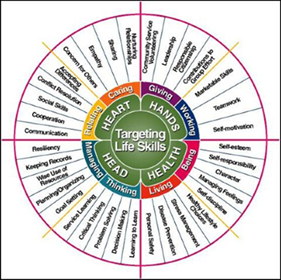
- Service Learning: Through 4-H club work, obtaining a Florida 4-H Community Pride Grant, and active membership on county/district councils, youth members take part in projects and experiences that help them how to become active participants in the communities and apply their experiences to real-life situations.
These are not the only life skills youth in Florida can learn and practice through 4-H- but they are part of almost every program we offer. These are examples of the priority life skills that Florida 4-H promotes among youth, with a focus on cognitive development, interpersonal skills, leadership, civic engagement, and practical skills. Florida 4-H aims to provide a comprehensive youth development program that equips young people with the skills they need to succeed in their personal lives, careers, and communities. Active involvement in 4-H will help members to connect life skills obtained through their 4-H involvement to real-life experiences. For more information on these youth leadership opportunities please contact your local 4-H office.
If you would like to help Florida 4-H teach life skills, or get your child involved in our program, reach out to your local UF/IFAS County Extension Office. There is an office in every county in Florida. Spring is a great time to get involved, because 4-H offers several summer programs for youth to develop life skills!
References:
Marilyn N. Norman and Joy C. Jordan.2018.Targeting Life Skills. EDIS document #4HSFS101.9
Hendricks, P.(1988). Developing Youth Curriculum Using The targeting Life Skills Model
Michigan State Extension. 2016. 4-H Head Life Skill Sheets.(4-H1679)
by aschortinghouse | Mar 31, 2023
Introduction
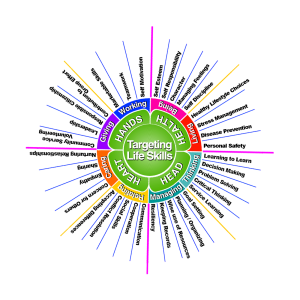
Figure 1: 4-H Life Skills Wheel Sources: (Hendricks, 1998) and (Norman & Jordan, 2018)
The goal of a 4-H program is for youth to learn about and develop life skills that will help them, in both the short term and long term, become contributors to their communities (Norman & Jordan, 2018). Life skills are the competencies or traits that relate to helping individuals’ function and navigate their lives.
When we begin planning 4-H programs with the end in mind, life skills are one of the considerations we should focus on. These skills should be identified during the planning process at the same time you are planning the objectives for each meeting. The life skills wheel illustrated in figure one serves as a tool to help visualize the most common life skills 4-H programs focus on. When we identify these skills, we can intentionally plan our programs to provide experiences that are specific and challenging without being overwhelming.
Often, we use projects and special interests as a hook to teach youth life skills. While some subjects are best suited to developing certain life skills, there are skills to be learned and developed no matter the exact subject being taught.
Getting Started
On the life skills wheel, all the life skills are categorized under the headings of head, heart, hands, and health which relates back to the 4-H pledge. By identifying the skills, you are targeting then planning activities to help you build those skills, you can build impactful programs that will continue to build on each other.
Let’s look at a scenario. We are working with a group of club officers at a training day preparing for the new 4-H year. The objectives for the meeting are for officers to learn their roles and for the youth learn more about each other so they are more comfortable working together. From here, we need to identify the skills we are hoping to build.
When you look at the life skills wheel there are numerous skills which could fit and be developed during this training. While some skills are built passively through experience, identifying three to five skills will help us identify activities and focuses that align with our objectives.
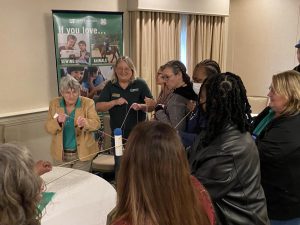
Picture 1: Volunteers participating in the bull ring activity at the 2023 NWD Volunteer Forum in Destin, Florida.
For this scenario, if we identify teamwork, problem-solving, communication, and planning/organizing as the life skills we intend to build, we need to identify activities that will build these skills. When working with activities we need to keep in mind that we need time for the do, reflect, apply model. So, once we do the activity, we need time for reflection, and a discussion on how we could apply what we have learned in the future.
If we look at this scenario a little bit closer, you will notice that some skills can be built during the same activity. An example of this would be if we were to use the bull ring activity, which has a tennis ball balanced on a ring by multiple strings are held by multiple participants standing in a circle as demonstrated in picture one, participants are going to use a bunch of life skills including communication, teamwork, problem-solving, and even planning. All these skills are necessary to successfully move the ball from point A to point B without dropping the ball. It is the intentional reflection and future application discussion of the skills that pulls in the impact and development of a skill beyond the passive learning that occurs.
Conclusion
4-H projects and meetings are an ideal environment for passive learning of life skills. However, it is the intentional planning of club and project leaders that results in active life skill development. So, as you are planning your next meeting, start with the end in mind. Identify your objectives and the life skills you want to develop, then intentionally plan activities and discussions which will lead youth through active thoughts and practice of the skills you are focusing on.
Resources
Hendricks, P. (1998). Developing youth curriculum using the targeting life skills model: Incorporating developmentally appropriate learning opportunities to assess impact of life skill development.
Norman, M., & Jordan, J. (2018, July 30). Targeting Life Skills in 4-H. https://edis.ifas.ufl.edu/publication/4H242
by pmdavis | Jul 1, 2022
It’s hard to believe the 4th of July is already upon us!
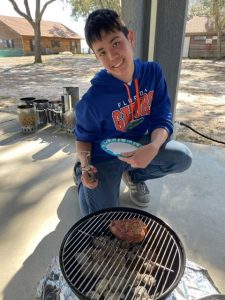
Youth learning to grill during 4-H tailgate program
Many of us will be celebrating with picnics, cookouts, and family get-togethers. One of my colleagues in Clay County, Samantha Murray, did a great article about preventing food poisoning while celebrating. Our youth have also been attending grilling summer camp programs and learning many of these tips plus lots more. The youth have learned about how to use a grill safely, how to prepare food safely and prevent cross-contamination or food-borne illness, and the nutritional benefits of animal protein in diets. Our district will have its annual competition to advance to the state-level competition on July 30 at the Washington County Extension Office, in Chipley, Florida.
I just wanted to take a moment to recap the tips Samantha gave to keep all of us safe and healthy while celebrating.
- Keep raw meats in a separate cooler than ready-to-eat items or beverages.
- Foods with mayonnaise are less acidic creating a better environment for bacterial growth
- Chicken and ground beef needs to be cooked to 165°F
- Wash hands if soap and water are not available use hand sanitizer to reduce the risk of contaminating food.
- Use different tongs or spatulas for cooked and uncooked meat or wash them after being in contact with raw meat.
- It is recommended to refrigerate leftovers within two hours unless it’s really hot, then the window shrinks to about an hour.
Other items you may want to think about.
- Keep beverages in a separate cooler from other foods, people will be going in and out of beverage coolers much more keeping the temperature higher and allowing bacterial growth.
- Cook cuts of pork, beef, or shrimp to 145°F
- Don’t sit charcoal grills on plastic tables and make sure the area is free from debris that can catch fire, including limbs or tents overhead.
- Clean up after yourself leaving only footprints in the area you were in!
- Enjoy time with friends and family safely!
For more information about educational programs, check out our webpage or contact your local UF IFAS Extension Office.
by Claire Davis | Mar 25, 2022
Being in the great outdoors is a great way to spend your time with family! What are some ideas for activities you can do outdoors with your friends and family? Some of the best outdoor activities could include going for a hike, swimming, hunting, kayaking, or even building a campfire. With the weather still cool and a little dry here in Northwest Florida, sitting around a campfire sounds like the right kind of fun! However, it is extremely important to be sure that your campfire does not put anyone at risk of wildfires or burns.
Check out some of the fire safety tips below!
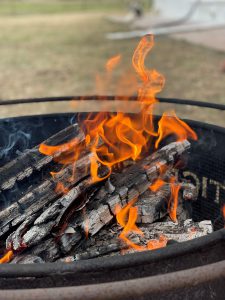
- Use a designated fire pit, if available. If this is not an option, clear a space on the ground, removing any grass or needles that could potentially catch fire.
- Build your fire downwind and away from tents, houses, or anything that is flammable. What does flammable mean? Anything that can easily set fire is flammable. The USDA suggests a minimum of at least 3 feet away from anything that can catch fire.
- Have water or something to douse the fire nearby. In the event of fire escaping its designated area, you will need to be able to put it out swiftly to prevent a wildfire. Consider a water hose that is hooked up to a water source or a fire extinguisher. Also, before leaving your fire site, make sure the fire is extinguished!
- You know the drill! Stop, Drop, and Roll! Make sure that everyone present knows how to put out a clothing fire with these three simple steps.
- Never leave children unattended around a fire. As the adult, it is your responsibility to make sure that everyone is safe! Also, store matches, lighters, and lighter fluids out of children’s sight and reach.
- Think about what you are wearing. Do not wear open toed shoes, as a spark could come off a flame and burn your toe. Instead, wear closed toed shoes while around the fire. Do not wear loose fitting clothing. If you lean over a fire with a baggy t-shirt on, chances are your shirt could catch on fire. Wearing snug-fitting clothing is an easy way to prevent this from happening.
Another “hot” topic is grilling! As we all know, fire and charcoals are extremely hot. Make safe cooking a priority, especially when it comes to outdoor grilling. With summer coming, grilling will become a more popular activity!
A great way for you youth to learn about safe grilling practices is for them to attend a 4-H Tailgate Grilling Camp! This summer,

Youth learning to grill pork safely!
Calhoun and Liberty County 4-H Agents, Claire Reach and Marie Arick will be teaming up to offer this program to area youth. Youth will not only learn about the importance of fire safety, but also how to mix rubs or marinades for their meats, and how to grill different animal proteins!
If this is something you think your child or a youth you know might be interested in, stay tuned for upcoming date announcements for summer camps. If you have questions, comments, or concerns, please give us a call at the UF/IFAS Extension Calhoun County Office: (850)-674-8323.
An Equal Opportunity Institution.
Sources:
https://www.firesafekid.org/family-fire-safety/outdoor-fire-safety/
https://www.usfa.fema.gov/downloads/fief/outdoor_fire_safety.pdf
by Marcus Boston Jr. | Feb 4, 2022
My name is Marcus Boston and I’m the County Extension Director and 4-H Youth Development Agent in Leon County, Tallahassee FL. I’m originally from Gainesville Florida and have worked for the Leon County Extension Service as a 4-H Extension Agent, for 29 years.
I was born and raised in Gainesville FL., the location of the State 4-H office but was never involved in 4-H as a youth. I graduated from Buchholz High School in Gainesville Florida and earned a football scholarship to attend school and play football for Florida A&M University (FAMU) in Tallahassee. As a result of my accomplishments on and off the team, during my senior year, I was awarded the prestigious Alonzo Smith “Jake Gaither” Award. I completed my B.S. degree in Agribusiness and while working as a graduate assistant coach on the football team, I completed my M.S. in Agricultural Sciences. Prior to starting graduate school, I worked as a Sideline Commentator for the Florida A&M football games that were aired on a local radio station. After completing graduate school, I began my professional career as an extension agent with Florida A&M University and the University of Florida working primarily with 4-H Youth Development.
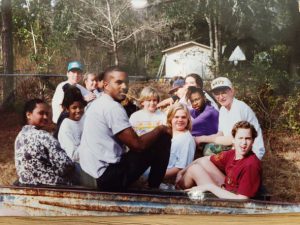
Marcus joins Leon County 4-H Leadership Club fun day activity in the early 90’s
When I started in Leon County one of my first assignments was to make a personal visit to all the existing 4-H clubs in the county at that time. After meeting all the wonderful volunteers and youth involved in our Leon County 4-H program, I was inspired by all the fun educational projects the youth were involved in and encouraged by the commitment and passion of the volunteers that oversaw the clubs. It is this commitment and passion that still exist today and that encouraged me to work extra hard to recruit and train volunteers so there could be more clubs for youth to join.
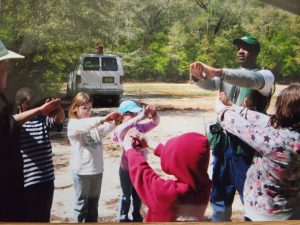
Marcus Boston teaching youth how to determine which eye is dominant before archery class
The establishment of my Environmental Education/Stewardship Program is one of my most successful programs here in Leon County. This program includes a series of smaller programs developed and carried out with the primary objective of educating our youth about the importance of conserving, protecting, and appreciating our environment and how they can become environmental stewards in their respective community’s. These experiences are tailored to equip youth participants with the information they need that will help them make logical decisions on environmental issues that may arise as they enter adulthood. In a few years these youth could be accountable for attitudes, perceptions and policies that affect our environment as well as our soil. A few of the environmental focused experiences that I developed and carried out during past several years as part of our Leon County 4-H program are: 4-H Ecology Field Day, 4-H Eco-ventures Spring Break Camp, Wild About Water Day Camp, The Talking Trash Day Camp, Going Green Day Camp, No Woods Left Behind Day Camp, Trees and Bows Day Camp, 4-H Wildlife and Outdoor Recreation Camp at Jubilee, and residential camp at 4-H Camp Cherry Lake held in Madison FL.
As a certified archery and canoe instructor, I’ve had the pleasure of teaching thousands of youth communications and safety skills using a canoe and a bow and arrow as the vehicle of choice. Both of which I’m still involved to this day. In an effort help young people learn the life cycle, I have taught the 4-H Embryology program in several schools in Leon County. This program has provided the opportunity for hundreds of students and teachers, to watch chicks hatch out of their eggs right before their eyes in their classroom…an experience they never forget.
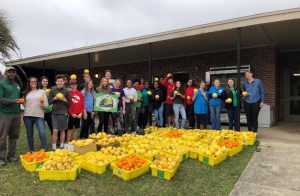
Leon County 4-H Camp Counselors kickoff counselor training with gleaning 1,300 lbs. of fruit to provide for homeless shelter
The Leon County 4-H Camp Counselor Training Program has also served as one of my most successful teen leadership programs. I have enjoyed recruiting, training and equipping hundreds of teens with the skills and knowledge they need to: Manage campers at our residential camp, understand the “ages and stages” of the youth they supervised, apply strategies for teaching classes at camp, and most important, keeping camp safe for all in attendance. Due to the success of this program, former counselors from our counselor training program are viewed and recruited as potential camp staff for our State 4-H camps each year.
I have also enjoyed providing opportunities for thousands of youth in Leon County Schools to participate in The 4-H Tropicana Public Speaking Program (now known as the Florida 4-H Public Speaking Program sponsored by Florida Power and Light) which annually provides an opportunity for over 7,000 Leon County 4th, 5th, and 6th graders to develop, write, and present a speech on a topic of their interest. With so much emphasis on texting and posting…this program continues to provide a platform for young people to develop their oral communication skills which is crucial as they graduate and enter the work force.
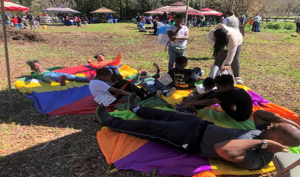
Marcus Boston is demonstrating fitness techniques with attendees during Youth Extension Day in Leon County.
I have also been a Project Learning Tree(PLT) facilitator for over 20 years and have help to train over 500 college students from Florida State, Flagler College and Florida A&M University in how to teach youth environmental education using the PLT curriculum.
The last six years as County Extension Director has provided me an opportunity to promote UF/IFAS Extension by managing and working with my faculty in providing researched based information in the form of workshops, field days, 4-H clubs, seminars, virtual and hybrid webinars and school enrichment programs in an effort to help youth and adults in the Leon County Community find the Solutions For Their Life. I have always believed that active participation in 4-H provides youth the tools in life to be successful in whatever direction they choose to go.

 peer teaching. Have teens assigned to new members that join in order to teach them the 4-H pledge, motto, club expectations, member names, etc. This creates a greater sense of belonging and fosters a supportive environment within the club for new members to engage more quickly and successfully.
peer teaching. Have teens assigned to new members that join in order to teach them the 4-H pledge, motto, club expectations, member names, etc. This creates a greater sense of belonging and fosters a supportive environment within the club for new members to engage more quickly and successfully.












